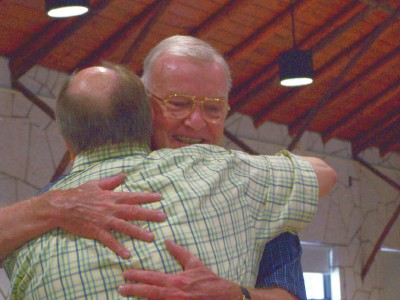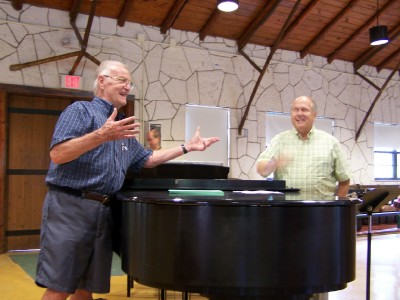DON’T PUT ME
D
D O
D O W
O W N
W N
N
D O N ‘ T P U T ME D
D O
D O W
O W N
W N
N
Matthew 5:38-48
Sermon by
Dr. Robert R. Ball
Memorial Drive Presbyterian Church
Houston, Texas
September 13, 1970
It was late one night this past summer. I’d had it with the books. I was
downstairs in the dormitory lounge, my feet propped up on a coffee table, sipping
from a very large bottle of iced tea. On the other side of the table sat a
Presbyterian minister from North Carolina. He is a strikingly handsome man, just
the other side of 40, with all the graciousness and charm of a gentleman from the
Old South. At that time of night, far from home, one tends to become very
philosophical. I found myself expounding on the point that “putting other people
down” is one of the most serious problems of our day, devastating in its effect on
marriage, family life, friendship – even the whole national and global crisis.
I mentioned that I saw it happening in our dormitory among mature pastors,
even between the best of friends. With friends, the put-down usually comes in the
form of a joke, with a big laugh at the end; but the dig in the middle is still there,
and it still hurts. Sometimes the friend who has been put-down comes back with
a put-down of his own; sometimes he just goes silent for a while. Either way,
laughing or silent, he’s hurting. My southern friend agreed.
“I know you’re right,” he said, “and what discourages me
is that I find myself doing it more than ever before. Maybe
it’s because of my age. Maybe I’m afraid that I’ll never
reach all of those goals I had set, so I feel the need to
defend and justify myself. Whatever it is, I find myself
doing it all the time. I put down my wife, my kids, the
people I really love and need.”
It’s hard for me to imagine that such an intelligent and sensitive man is putting
people down more than ever before. My suspicion is that he is simply more
aware of it than he used to be. The insight of maturity is always something of a
burden. It’s not easy to look at unpleasant things in our personalities; but unless
we are willing to look, we will never grow up.
Putting other people down IS a major problem – for all of us. Kids do it . . .
“fat kids, skinny kids, kids who climb on rocks;
tough kids, sissy kids, even kids with chicken pox.”
They do it to each other and to their parents. Parents do it; to each other, to their
friends, to their kids. Races do it. Politicians do it. Countries do it to other
countries. With all the put-downs going on, it is not surprising that we have so
many conflicts raging in our families and in the world.
I.
Putting other people down does not begin as an intentional, malicious scheme.
It often becomes that but that’s not where it starts. It begins with our insecurity.
Everyone in the world wants to think well of himself and his capabilities, but that’s
not easy to do. when we begin to feel tight and frightened, we try to build ourselves
up by putting someone else down.
A child gets permission to paint a picture while mother does the ironing. A bit
later mother checks to find paint all over the child, all over the rug, all over the wall.
All she can think about are the things she needs to get done, but now she won’t
because of the mess she has to clean up. She bursts out with,
“Oh, you can’t do anything right. You always make
a mess of everything you try. Why do you have to be
so clumsy and bad?”
The mother didn’t intend it, but that’s a pretty devastating put-down. The child
has been given to understand that he is a bad and incompetent person. Mother
didn’t say,
“This mess you’ve made makes me very angry.”
She said, “You are bad.”
It was not what the child had done that she attacked, but the child himself.
Nobody likes to think of himself as a bad and incompetent person, so the child
must find some opportunity to prove that he is not. A little later his chance comes.
A group of children are outside playing hopscotch, but one little girl just can’t get the
hang of it. She keeps falling down and stepping in the wrong square. The child who
previously had been put down by his mother sees a chance to redeem himself.
“Ha, ha, ha, you clumsy clown. You can’t do anything
right. Look at me. I can do it a hundred times better
than you can.”
Another put-down. Another hole in someone’s fragile bag of self worth. And
where does it end? It doesn’t. It goes on and on. It goes through school.
“My grades are better than yours. My boyfriend is
better looking than yours. My car will go faster than
yours. I can get turned on better than you can.”
It goes into marriage.
“You always goof up everything. You just don’t know
how to handle the kids. Why do you always have to
be such a kill-joy?”
It goes into business.
“How can you make such a stupid mistake? When are
you guys in Shipping going to start working with the
rest of us instead of against us?”
Putting other people down begins in insecurity but it becomes a way of life.
We put other people down so much that except for special occasions, when
we are attacking some obvious enemy, we usually aren’t even aware of it. It’s a
nervous habit; something we say when we don’t know what else to say; a futile
effort at being funny; a subtle game we play even with people who aren’t our
obvious enemies – like our wives. It’s a disastrous game that nobody seems to
know how to get out of.
II.
Put-downs may seem to be ignored, but they aren’t. They always light a fire. If
someone puts you down, you feel compelled to get back at him. Honor demands
it! Besides, we have this sneaking feeling that they may be right. What a horrible
thought! Don’t think about it. Get back at them! Prove that it isn’t true! Q put-down
always draws a response – if not immediately, then in some long-term,
smoldering hostility.
Years ago I talked to a middle-aged couple who had a long and, apparently, a
happy marriage. She was a domineering person but he didn’t seem to mind.
Then one day he got too much. That’s why they came in to see me. It seems that
she had gone upstairs to take a shower. She couldn’t get any hot water so she
came downstairs to check. There he was standing at the kitchen sink with the
hot-water tap turned on full blast and with a wicked grin on his face. “I don’t
understand,” she sobbed, “how he could suddenly become so mean.”
If you care to check around, you will find the effects of our put-down way of life
hanging over us like a constant cloud of poisoning pollution. The put-down is at
the base of every marital fight that ever happened. It is right at the center of our
much publicized and painful generation gap. it is the order f the day in relations
between races and nations. If something is to be done to bring peace in any of
these areas of warfare, something must be done about the put-down and the
causes that lie behind it.
If I read the New Testament correctly, this is what the Gospel is all about. This
is why Jesus Christ has come. He has come to put an end to our weary warfare,
both the warfare inside of us and our warfare with our brothers. He has come to
restore us to the fullness of our humanity. This is where he begins.
I do not condemn you. I know how miserable you
are. I know how much you yearn to live. I do not
hold your misdeeds against you. I do not want to
put you down; I want to build you up. Here, accept
my love. receive the assurance of my forgiveness.
You are my brothers, the sons of God. You matter
so much that I will give my life for you. I do not
condemn you. Neither can anyone else. You are
not condemned!
III.
That’s what changes lives. You will live a different life when it gets through to
you that you are not condemned. You will live a different life because you will be a
different person, a worthy person, not a condemned one. That’s the way it really
works.
Several months ago, a friend of mine bought some equipment from a particular
company. It wasn’t right, and he tried for months to get them to come fix it. When a
workman finally came, he was the dirtiest, most sullen person you can imagine.
His body gave off a smell that matched his attitude of bitterness and ill will. My
friend had plenty of reason to be upset at the long delay and the man;s surly
attitude. He started to react to the repairman out of his anger and disgust, Then
my friend thought: “This fellow was upset and ill-tempered before he ever got here.
He’s not really putting me down. There must be a lot of unhappy things in his life.”
So, instead of giving the fellow what he deserved, my friend said something like,
“I’ll bet it really gets to be exhausting running all
over town, working fouled-up equipment in this
hot weather.”
The workman’s attitude completely changed. Perhaps for the first time in his
life he had met someone who didn’t try to put him down. He did what needed to be
done cheerfully. Not only that, he offered to come back the next day with a better
replacement part; and he did.
What was it that Jesus said in our scripture this morning?
You have heard that it was said, “You shall love
your neighbor and hate your enemy.” But I say
to you, Love your enemies and pray for those
who persecute you so that you may be sons of
your Father who is in heaven.
What does it mean to be a son of God? Well, it can’t mean less than this:
DON’T PUT OTHER PEOPLE DOWN. That doesn’t mean that we should get
our kicks from letting other people run all over us. It means we don’t have to get
back at them or put them down.
When the message which God sends to us in Christ gets through to us, we
become different people. We no longer feel compelled to prove ourselves
important. We are more able to care and understand because we have been
cared for and understood. Our lives change and our changed lives change the
lives of others. Changed lives change the world. We pray to be made instruments
of God”s peace. Instruments of God’s peace don’t go around putting other people
down.
IV.
But how can we be people like that? Not by setting our minds to it; that’s for
sure! you know how successful we are with our New Year’s resolutions. To focus
on a problem usually has the result of making it even worse.
When you focus in on a problem, you can’t see anything else. And there’s a
great deal more that needs to be seen. That’s what we need: a new way of
looking. That’s what Christ gives us. He allows us to see ourselves as he sees us,
which is the only truth about us. The Son of God sees us as precious, important,
and able; he says, “There is no condemnation against you.” We need to begin
each day with the prayer,
“O Lord Christ, give me your vision; help me
this day to know the power of your grace; allow
me to feel the confidence of your love. Make
me an instrument of your peace.”
When we are relieved of the burden of focusing in on ourselves and our
problems, we also get a whole new view of other people. We are able to see them
as Jesus sees them. We no longer see them simply in terms of whether or not they
please us, which is the way we usually see others, as if they existed to serve our
purposes and to feed our egos. We can see them struggling under the burden of
many years of put-downs, desperately hoping to find some understanding and
concern, but almost past the point of hoping.
Every mean and bitter person you know is waiting for that look from the eye of
a disciple – just as you are waiting for it yourself. That angry neighbor, that surly
fellow worker, that woman whose kids and clothes are always a little nicer than
yours and never hesitates to tell you so; that child who causes you so much pain;
that husband who has broken your heart so bitterly; and all the others who bring
tension and discord into your life. When these people experience that look which
does not put them down, they are changed. They are released to begin to recover
what has been lost to them: their sense of worth and meaning and hope.
What would it mean in a family, a class at school, a neighborhood, a marriage,
an office, if they were but one person who would practice mercy because he has
received mercy? That person would be an instrument of His peace. Through him,
God’s Kingdom would begin to come here on earth as it is in heaven.
This is the task to which Christ calls us.
My brother, Christ has lifted us up;
I will not put you down.
 |
My editorial comment is irresistible:
In typing this up for the website, I have had a welcome opportunity to read the words and absorb the message as I am copying. In this past summer, the summer of of 2010, at our Joyful Noise reunion we had such a welcome visit with Dr. Ball, Allen Pote, and Bill Carl (and their wives). Dr. Bob expressed his feeling that we were still young kids in his heart and mind, and that thinking of us as fifty-somethings with our own children and grandchildren was difficult for him.
If one looks at paragraphs ONE and THREE of this sermon, it is clear from the context that Dr. Ball is still SO YOUNG at the time of the writing, that a forty-something man seemed to have “the insight of maturity” which seemed to this younger Bob Ball “something of a burden.” All of which sent me into peals of laughter, probably NOT the effect intended for that particular portion of the sermon.
One has to wonder what that younger Dr. Robert R. Ball would have thought of an ancient child of fifty six….let alone a man in his eighties.
THERE is the insight of maturity!
—Candace Hibbard Lillie
 |
My second editorial comment is more of an anecdote:
Ten years later, when I was married to one of the members of the cast of CRESCENDO!, the musical written by Allen Pote, Bill Carl, and Mary Kyte during the summer of which this sermon refers,
We experienced something relevant to this topic.
After an afternoon with some friends whose main amusement was biting conversation full of piercing repartee, we were busy verbally destroying each other and it suddenly occurred to me that this was destroying our long term friendship, and not very good for our marriage. I stopped in mid put-down and we discussed how destructive this sort of conversation was to our relationship, deciding right then not to do it any more.
I am sure neither of us remembered hearing this particular sermon, but i am also sure that it had such an effect upon my heart and mind at the time i first heard it, that I had been sure to bring a copy of the text home and preserve it for my future reference.
Again, please remember that every one of the sermons presented here on these pages was collected and carefully preserved by a teenager. They are just as relevant to these aging children now in 2010 as they were in 1970.
Love, Candace
 |
